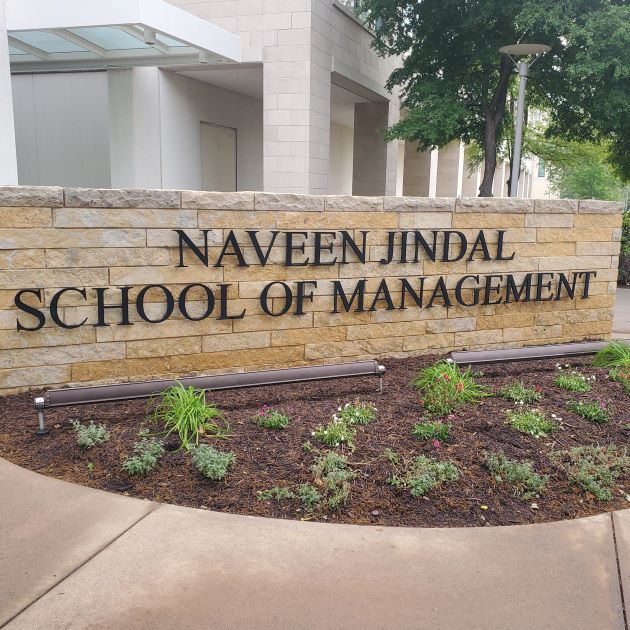A new course the Naveen Jindal School of Management launched this semester gives students opportunities to use elements of artificial intelligence and apply machine-learning capabilities in apps they create to solve business problems — all while picking up new skills in next-generation, in-demand app development. And that, says course creator Gaurav Shekhar, is why the business analytics course, Robotic Process Automation, is at the front of the pack in information technology teaching right now.

The robots the RPA name suggest are the computer crawler kind, embedded in coding used in automation. And automating business processes is at the crux of the graduate-level course, says Shekhar, an assistant professor of instruction in information systems and director of the MS in Business Analytics Flex and Online programs. Students learn how to take a series of related business tasks previously performed only by people, develop a process for them and then automate that process so it can be operated by a computer.
Because business-process automation frees up workers, increases efficiency and generally makes a company more change-ready, demand for it is increasing.
Forrester, a technology research and consulting firm, has predicted robotic process automation will grow from $250 million in 2016 to $2.9 billion in 2021. And Grand View Research, a San Francisco-based market research and consulting firm, said in a market analysis report last July that the size of the global robotic process automation market, valued at $1.4 billion in 2019, “is projected to exhibit a compound annual growth rate of 40.6% from 2020 to 2027.”
Tapping into App Development Advances
The stepped-up pace of automation owes a lot to advances in app development, Shekhar says, and the RPA course has tapped into that, too, via an industry partnership with Appian, a Virginia-based software developer and cloud-computing company, that gives students access to the Appian Low-code Automation Platform.
Not familiar with low code? Think of it his way, Shekhar says: If you were assigned to create a new computer application from scratch, you likely would write 100,000 lines or more of computer commands — code — to make the app work. On a low-code platform, a lot of the commands you need are already created and packaged in a way — in icons, labels or visual images —that you can drag and drop them into your new program. Commands like “Start,” “Submit,” “Return to Home,” for instance, are low-code staples.
At the end of creating a new app on a low-code platform, you may need to write some new code to label your program or differentiate it, Shekhar says. “So, yes, you should know how write code before you sign up for RPA. But with the low-code platform, instead of writing 100,000 lines of code, you write 3,000.”
Not only are the ease and speed at which you can create an app greatly improved, Shekhar says, “but think of how many more apps you can create.”
Although low code has been around about a decade, demand for it and for IT professionals who know how to use it has been accelerating.
JSOM Connects
A chance encounter between Jindal School faculty and Appian executives led JSOM to first partner with Appian to give students a five-day low-code training workshop over spring break in 2019, Shekhar says.
But he did not recognize “a disconnect” between demand for low-coding and professionals able to use it until he went to an Appian User’s Group meeting the Jindal School hosted that same year. What participants from almost 60 organizations represented at that meeting mainly discussed were the skill sets they needed but were not finding in job applicants, Shekhar says, and he realized that as a “great tech talent provider,” JSOM should equip more students with low-code training.
Shekhar subsequently made low-code development with Appian the basis for a new-in-2019 Digital Consulting Project (MIS 6349) senior capstone class.
By the next year, the class project delivered AI-based intelligent document processing to business operations at Dallas Fort Worth International Airport.
Results “were impressive,” Michael Youngs, vice president of Information Technology Services at Dallas Fort Worth International Airport, said in an Appian news release in February. Students provided new artificial intelligence capabilities “that will reduce our need for paper forms and accelerate our business processes. This is furthering DFW Airport’s commitment to modernize and digitalize its business processes airport-wide.”
“UTD is at the forefront in understanding the tremendous career opportunities available to graduates with low-code expertise.” Michael Beckley, founder and chief technology officer at Appian, commented in that same release.
The Digital Consulting Project course will be back this fall, Shekhar says, as will Robotic Process Automation (BUAN 6385) — which will have an additional professional incentive: Students who complete the course will get free one-time access to the Appian Level I Developer certification exam.





